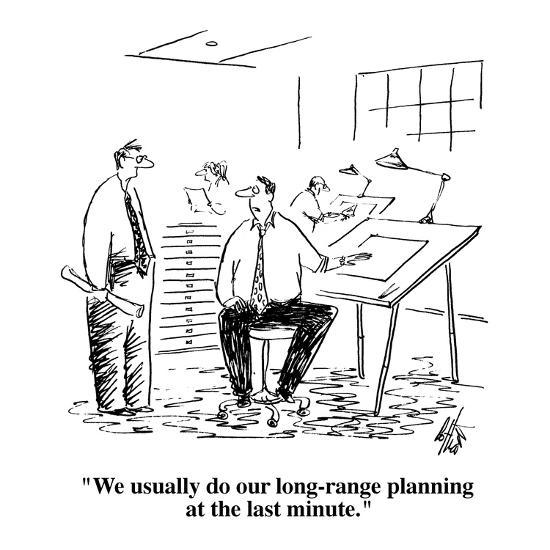
German artist Manfred Laber came up with a futuristic way to honor the 793 AD founding of the town of Wemding in the southern German state of Bavaria, which celebrated its 1,200th birthday in 1993. Laber designed a “Time Pyramid” made from concrete blocks, but neither he nor anyone living today will ever see it completed.
That’s because a new block is only added to the structure every 10 years—the fourth is expected to be placed in 2023—making the completion date around the year 3183. [From WiseGeek.com]
Granted, this is an extreme and inapplicable example of long-range planning, so let’s discuss the benefits of a more reasonable approach.
We often neglect long-term planning. Near-term problems, opportunities, and temptations monopolize our attention and we become nearsighted. We often get distracted by urgent tasks, but what is urgent is seldom important and what is important is seldom urgent. And we often focus on unimportant issues and neglect important ones—we’ll spend more time planning our upcoming weekend than our retirement.
On a regular basis, think about where you’d like to be in life 5, 10, or 20 years from now. Take a holistic approach to planning—develop goals and plans in many areas: financial, professional, family, intellectual, academic, spiritual, and social. Then make a plan to reach each goal and work your plan. It’s as simple as that.
As you consider various plans, connect them to execution. A plan defines what you want to do; execution involves how you will do it). When execution is missing, plans decay into wishful thinking.
Here are some simple but potent adages that apply to this conversation.
- If you aim at nothing, you will always hit it. Always have goals you’re pursuing. Without them you’ll squander your time and energy.
- He who aims for the stars shoots higher than he who aims for the trees. Even if you make stretch goals and don’t accomplish them, you’ll probably end up in a better place than if you aim too low.
- We never drift anywhere that’s desirable. Without a pre-planned destination, we usually end up in a suboptimal place. Ten years from now you are going to be doing something, but if you don’t aggressively plan, you’ll drift to a mediocre place.
Goal setting works. Twenty-five years ago Mary and I developed a 12-year plan to get out of debt. We did it in 10 years. Twenty years ago we set a goal to visit 60 countries before we die. Several months ago we added #48 — Qatar.
Getting started is easy: spend 60 minutes thinking about the rest of your life. Then do it again and often. When you have some potential options, share them with some friends and get their input. Then choose ones you want to pursue. Once you’re armed with a viable goal and plan, work your plan.
[Note to leaders: Ironically, organizational long-range planning has become difficult. In the marketplace, major changes come so rapidly that long-term plans can quickly become obsolete. Some leaders even question the value of organizations planning 20-30 years ahead because if you forge a 20-year plan, commit major resources to it, and aren’t able to adopt and change quickly, the plan can lead you astray. That’s why many leaders now consider “long-term” to be 4-6 years, with plans updated every six months.]

Hochinteressant!
I had to look that up 🙂
Don, I appreciate your emphasis on long-range planning. I like to distinguish long-range planning from strategic planning by their time horizons. For me, long-range planning envisions what an organization will look like a decade or more from now. Strategic planning has a time horizon of 3-5 years and is constantly updated. Long-range planning is designed to be transformational, while strategic planning focuses on performance goals and objectives. That’s how I see it anyway.
Bill, thanks for taking the time to respond. I like your distinction between strategic and long-range planning. Your life and career are testimonies of good planning. Take care.
Good column, I agree overall with it. Toffler pointed out in Future Shock that we’ve always dealt with change but not the frequency of it we now experience it; less and less time to evaluate and absorb it as a society. I tend to lean toward Reggie McNeal’s comments in This Present Future: Six Tough ?’s for the Church that we need to spend less time PLANNING for the future and more time PREPARING for it. Reflective time is essential when looking forward, but always with flexibility and adaptability at its core. This applies to church, corporate, or personal forecasting.
Allan, as always, I thank you for sharing your thoughts. They are always insightful. You’re right, the rate of change is ever increasing, leaving less time to assimilate. I like the phrase about preparing. Take care. Don
Good thoughts. I incorporate much of what you wrote. I like to include these plans in my journal. Makes for interesting reading when I look back several years in review. Since you plan ahead, what is the destination for country #49? Thanks Don!
Hi Chad. I like that you journal; it’s a helpful habit. Relative to travel, on September 4 Mary and I board a 14-day cruise of the British Isles and Iceland, so we’ll add three countries: Scotland, Ireland, and Iceland. Do you like to travel?
I do, although it has been very limited due to raising five kids. Once my time becomes more readily available and flexible, I plan to make travel, both domestic and abroad, a regular appointment. There is so much of God’s beautiful creation to see and so many different cultures to explore and from which to learn.
Roger that…